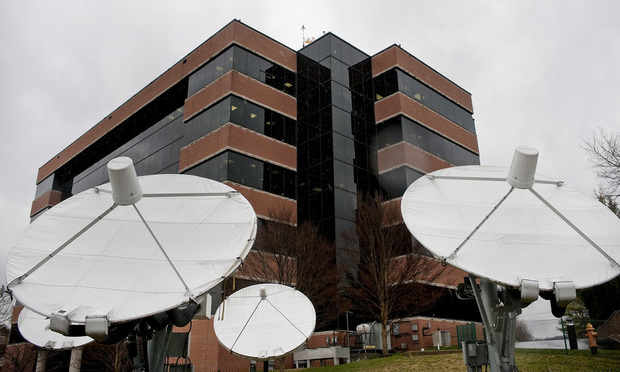Tribune Sues for $1B in Damages After Canceling Deal With Sinclair
The lawsuit filed by Debevoise & Plimpton targets Sinclair's "belligerent and unnecessarily protracted" negotiations with regulators.
August 09, 2018 at 02:57 PM
5 minute read
 Sinclair Broadcasting in Hunt Valley, Maryland. Photo: Jonathan Hanson
Sinclair Broadcasting in Hunt Valley, Maryland. Photo: Jonathan Hanson
Tribune Media Co. on Thursday terminated its planned $3.9 billion merger with Sinclair Broadcast Group Inc. and sued to recover $1 billion from its former deal partner for allegedly failing to obtain regulatory approval for a transaction that would have created a conservative news giant capable of reaching 72 percent of U.S. households.
The lawsuit, filed by attorneys from Debevoise & Plimpton, seeks to avoid what Tribune said could have been years of administrative delay and instead asked the Delaware Court of Chancery to rule that Sinclair breached its contractual duties to make “reasonable best efforts” to close the deal quickly.
Tribune is represented by Mark P. Goodman, Elliot Greenfield, Nathan S. Richards and Anna R. Gressel of Debevoise in New York. Gregory P. Williams, Blake Rohrbacher and Daniel E. Kaprow of Richards, Layton & Finger are acting as local counsel.
The 62-page complaint targeted Sinclair's “belligerent and unnecessarily protracted” negotiations with regulators in an alleged bid to avoid selling television stations to comply with U.S. antitrust laws. Last month, the Federal Communications Commission voted to send Sinclair's divestiture applications to an administrative law judge for review, a move that Tribune said had effectively torpedoed the merger.
“In light of the FCC's unanimous decision, referring the issue of Sinclair's conduct for a hearing before an administrative law judge, our merger cannot be completed within an acceptable timeframe, if ever,” Tribune CEO Peter Kern said in a statement. “This uncertainty and delay would be detrimental to our company and our shareholders. Accordingly, we have exercised our right to terminate the merger agreement, and, by way of our lawsuit, intend to hold Sinclair accountable.”
Sinclair did not immediately respond to a request for comment Thursday.
According to the complaint, the merger agreement required Sinclair to avoid “even the threat” of regulatory review when off-loading television stations in 10 markets where both companies owned top-four stations. However, Tribune said Sinclair consistently pushed back on demands from the FCC and U.S. Department of Justice before finally developing a “highly unorthodox” plan to transfer stations into a contingent trust and allow Sinclair to ultimately decide which stations to divest.
“No contingent trust like this had ever been approved by the FCC division reviewing the merger, and the FCC staff very clearly told Sinclair they strongly disfavored it. Yet Sinclair self-servingly pursued it anyway in order to delay for as long as possible publicly identifying the stations it ultimately would divest,” Tribune said in the filing.
But Tribune said the final blow came in late February when Sinclair proposed sales to parties linked to the firm's executive chairman, David Smith, in transactions that would effectively enable Sinclair to maintain control over all aspects of station operations and allow the company to profit off of assets it was obligated to divest.
According to Tribune, Sinclair failed to disclose those connections to the FCC in its applications and in response to public comments, in which opponents of the deal had raised concerns about Sinclair's plan.
On July 19, the FCC issued a unanimous decision calling the divestitures “sham transactions” and referred Sinclair's proposals to a full administrative hearing.
“By proposing self-serving divestitures that raised significant regulatory questions, Sinclair yet again fell well short of its contractual obligations to take all actions to avoid every governmental impediment to achieving a prompt closing,” Tribune said in the complaint.
Thursday's filing comes just one day after the deadline for Sinclair to close the deal.
The companies announced the merger in May 2017, in a move that sparked massive backlash from critics who opposed a combination of two of the country's largest broadcasters into a giant with control of 233 stations across the United States. Sinclair has also been criticized in lobby campaigns for a conservative bent that opponents said would mar its news coverage.
On Thursday, Allied Progress, a left-leaning consumer watchdog that was critical of the deal, celebrated Tribune's decision to withdraw, but cautioned that Sinclair may try to pursue other tie-ups in an effort to expand its influence.
“The leadership at Sinclair has expressed a desire to see a future where local television news stations are controlled by one or two companies,” Karl Frisch, the group's executive director, said in a statement. “That is less likely to happen with today's announcement but we must remain vigilant—Sinclair isn't likely to learn the right lessons from the collapse of this merger. They will be back.”
Tribune's stock was up more than 3 percent Thursday afternoon, and Sinclair's stock was trading at more than 2.7 percent above yesterday's close.
An online docket-tracking service did not list attorneys for Sinclair.
The case, captioned Tribune Media v. Sinclair Broadcasting Group, has not yet been assigned to a judge.
This content has been archived. It is available through our partners, LexisNexis® and Bloomberg Law.
To view this content, please continue to their sites.
Not a Lexis Subscriber?
Subscribe Now
Not a Bloomberg Law Subscriber?
Subscribe Now
NOT FOR REPRINT
© 2025 ALM Global, LLC, All Rights Reserved. Request academic re-use from www.copyright.com. All other uses, submit a request to [email protected]. For more information visit Asset & Logo Licensing.
You Might Like
View All
Here's What Corporate Litigators Expect Delaware Courts to Address in 2025
6 minute read
Tesla, Musk Appeal Chancery Compensation Case to Delaware Supreme Court
2 minute read
Fed Judiciary Panel Mulls Authority to Ban In-State Bar Admission Requirements

Delaware Legal Figures Who Played Key Roles in Ending School Segregation Honored With Presidential Citizens Medal
3 minute readTrending Stories
Who Got The Work
Michael G. Bongiorno, Andrew Scott Dulberg and Elizabeth E. Driscoll from Wilmer Cutler Pickering Hale and Dorr have stepped in to represent Symbotic Inc., an A.I.-enabled technology platform that focuses on increasing supply chain efficiency, and other defendants in a pending shareholder derivative lawsuit. The case, filed Oct. 2 in Massachusetts District Court by the Brown Law Firm on behalf of Stephen Austen, accuses certain officers and directors of misleading investors in regard to Symbotic's potential for margin growth by failing to disclose that the company was not equipped to timely deploy its systems or manage expenses through project delays. The case, assigned to U.S. District Judge Nathaniel M. Gorton, is 1:24-cv-12522, Austen v. Cohen et al.
Who Got The Work
Edmund Polubinski and Marie Killmond of Davis Polk & Wardwell have entered appearances for data platform software development company MongoDB and other defendants in a pending shareholder derivative lawsuit. The action, filed Oct. 7 in New York Southern District Court by the Brown Law Firm, accuses the company's directors and/or officers of falsely expressing confidence in the company’s restructuring of its sales incentive plan and downplaying the severity of decreases in its upfront commitments. The case is 1:24-cv-07594, Roy v. Ittycheria et al.
Who Got The Work
Amy O. Bruchs and Kurt F. Ellison of Michael Best & Friedrich have entered appearances for Epic Systems Corp. in a pending employment discrimination lawsuit. The suit was filed Sept. 7 in Wisconsin Western District Court by Levine Eisberner LLC and Siri & Glimstad on behalf of a project manager who claims that he was wrongfully terminated after applying for a religious exemption to the defendant's COVID-19 vaccine mandate. The case, assigned to U.S. Magistrate Judge Anita Marie Boor, is 3:24-cv-00630, Secker, Nathan v. Epic Systems Corporation.
Who Got The Work
David X. Sullivan, Thomas J. Finn and Gregory A. Hall from McCarter & English have entered appearances for Sunrun Installation Services in a pending civil rights lawsuit. The complaint was filed Sept. 4 in Connecticut District Court by attorney Robert M. Berke on behalf of former employee George Edward Steins, who was arrested and charged with employing an unregistered home improvement salesperson. The complaint alleges that had Sunrun informed the Connecticut Department of Consumer Protection that the plaintiff's employment had ended in 2017 and that he no longer held Sunrun's home improvement contractor license, he would not have been hit with charges, which were dismissed in May 2024. The case, assigned to U.S. District Judge Jeffrey A. Meyer, is 3:24-cv-01423, Steins v. Sunrun, Inc. et al.
Who Got The Work
Greenberg Traurig shareholder Joshua L. Raskin has entered an appearance for boohoo.com UK Ltd. in a pending patent infringement lawsuit. The suit, filed Sept. 3 in Texas Eastern District Court by Rozier Hardt McDonough on behalf of Alto Dynamics, asserts five patents related to an online shopping platform. The case, assigned to U.S. District Judge Rodney Gilstrap, is 2:24-cv-00719, Alto Dynamics, LLC v. boohoo.com UK Limited.
Featured Firms
Law Offices of Gary Martin Hays & Associates, P.C.
(470) 294-1674
Law Offices of Mark E. Salomone
(857) 444-6468
Smith & Hassler
(713) 739-1250






